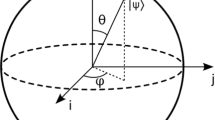Abstract
The aim of this paper is to establish a mathematical fundamental of complex duality quantum computers (CDQCs) acting on vector-states (pure states) and operator-states (mixed states), respectively. A CDQC consists of a complex divider, a group of quantum gates represented by unitary operators, or quantum operations represented by completely positive and trace-preserving mappings, and a complex combiner. It is proved that the divider and the combiner of a CDQC are an isometry and a contraction, respectively. It is proved that the divider and the combiner of a CDQC acting on vector-states are dual, and in the finite dimensional case, it is proved that the divider and the combiner of a CDQC acting on operator-states (matrix-states) are also dual. Lastly, the loss of an input state passing through a CDQC is measured.
Similar content being viewed by others
References
Long G L. The general quantum interference principle and the duality computer. Commun Theor Phys, 2006, 45: 825–843
Gudder S. Mathematical theory of duality quantum computers. Quantum Inf Process, 2007, 6: 37–48
Long G L, Liu Y. Duality quantum computing. Front Comput Sci China, 2008, 2: 167–178
Gudder S. Duality quantum computers and quantum operations. Int J Theor Phys, 2008, 47: 268–279
Long G L. Mathematical theory of the duality computer in the density matrix formalism. Quantum Inf Process, 2007, 6: 49–53
Long G L, Liu Y. Duality computing in quantum computers. Commun Theor Phys, 2008, 50: 1303–1306
Long G L. Duality quantum computing and duality quantum information processing. Int J Theor Phys, 2011, 50: 1305–1318
Zou X F, Qiu D W, Wu L H, et al. On mathematical theory of the duality computers. Quantum Inf Process, 2009, 8: 37–50
Wang W Y, Shang B, Wang C, et al. Prime factorization in the duality computer. Commun Theor Phys, 2007, 47: 471–472
Long G L, Liu Y, Wang C. Allowable generalized quantum gates. Commun Theor Phys, 2009, 51: 65–67
Cao H X, Li L, Chen Z L, et al. Restricted allowable generalized quantum gates. Chin Sci Bull, 2010, 55: 2122–2124
Zhang Y, Li L, Cao H X. Realization of allowable generalized quantum gates. Sci China-Phys Mech Astron, 2010, 53: 1878–1882
Chen Z L, Cao H X. A note on the extreme points of positive quantum operations. Int J Theor Phys, 2009, 48: 1669–1671
Wang Y Q, Du H K, Dou Y N. Note on generalized quantum gates and quantum operations. Int J Theor Phys, 2008, 47: 2268–2278
Du H K, Wang Y Q, Xu J L. Applications of the generalized Luder’s theorem. J Math Phys, 2008, 49: 013507–013512
Du H K, Dou Y N. A spectral characterization for generalized quantum gates. J Math Phys, 2009, 50: 032101–032107
Author information
Authors and Affiliations
Corresponding author
Rights and permissions
About this article
Cite this article
Cao, H., Chen, Z., Guo, Z. et al. Complex duality quantum computers acting on pure and mixed states. Sci. China Phys. Mech. Astron. 55, 2452–2462 (2012). https://doi.org/10.1007/s11433-012-4916-1
Received:
Accepted:
Published:
Issue Date:
DOI: https://doi.org/10.1007/s11433-012-4916-1




